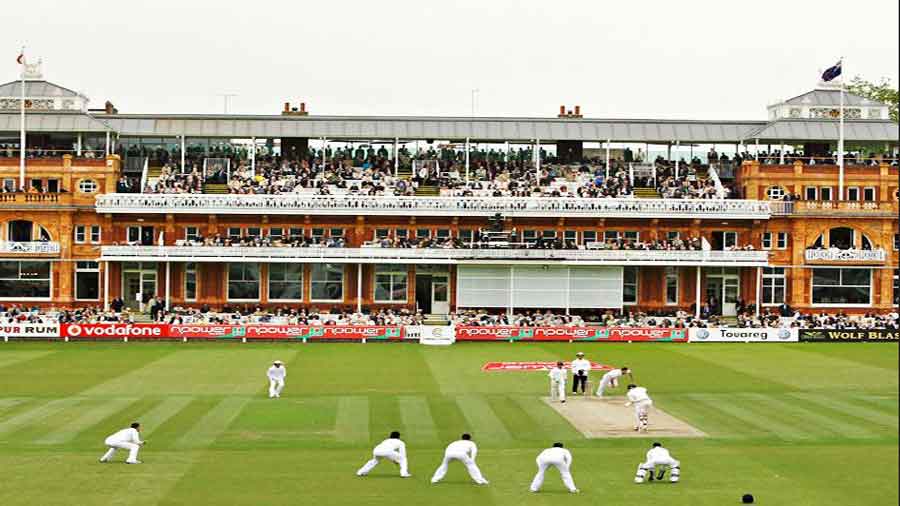Zoom out
Sir — Cricket offers photographers a sporting canvas unlike any other. This can be attributed to what the renowned writer, Neville Cardus, called cricket’s “occasional static quality”. The drama is not always just in the action. In fact, some of the most dramatic cricket photographs are of moments when players are poised for action, frozen in place by the camera, with their white jerseys cutting a stark contrast to a field of green. At this juncture, when the batsman has taken guard and the bowler is on the verge of releasing the ball, anything can happen. The photograph creates and sustains suspense. Unfortunately, cricket photographers nowadays seem to focus only on overt displays of joy, sadness or aggression by individual cricketers and not the sport itself.
R.K. Mukherjee, Calcutta
Broken ties
Sir —Almost 50 years after he joined the Congress, Ghulam Nabi Azad has quit the party with a scathing letter listing the alleged reasons for its downfall (“Guns aimed at Rahul, Azad quits”, Aug 27). He has laid the blame for the Congress’s downfall squarely on Rahul Gandhi’s shoulders, calling the latter “childish” and influenced by a “coterie of inexperienced sycophants”. Even if one were to believe the allegations in Azad’s letter, one could ask why it took him so long to resign. If he has known about the sorry state of affairs since Rahul Gandhi took over the Congress’s reins and did nothing about it, he, too, is responsible for the party’s downfall. Azad is popular across the political spectrum. Given that the Jammu and Kashmir elections may soon be held, his resignation could be a bid to switch sides in order to come to power there. Rumour has it that Azad may soon launch his own party. Bidyut Kumar Chatterjee, Faridabad Sir — There are several clear reasons behind Ghulam Nabi Azad’s decision to quit the Congress. First, he was denied a renomination to the Rajya Sabha this year. Second, Sonia Gandhi has proposed the name of party loyalist and Rajasthan chief minister, Ashok Gehlot, for the post of party president. Azad’s grievances against the Congress’s style of functioning are not new. Members of the NehruGandhi family have always had coteries. Was not Azad himself a part of Sanjay Gandhi’s coterie? Azad must acknowledge that what he has received from the party is much greater than what he has given back to it. S.K. Choudhury, Bengaluru Sir — The 23 dissident leaders within the Congress claim that they want the party to function autonomously. Yet, every time one of them is sidelined in favour of someone new, he or she resigns. Is this what autonomy should be like?
Kakoli Das, Calcutta
Grave threat
Sir — India’s second-richest man, Gautam Adani, has launched a hostile takeover of the country’s popular news franchise, NDTV, in a deal that has sparked concerns about the future of one of the media outlets prepared to criticise the government. NDTV is widely regarded as one of the few media groups that takes a critical view of the Narendra Modi-led Bharatiya Janata Party government. Gautam Adani is a strong ally of Modi, who has been known to fly on Adani’s corporate jets. The takeover will also pit Adani against his rival, Mukesh Ambani, whose Reliance Industries is already an established power in the country’s media sector with controlling interests in Network18. India’s media firmament is at its weakest point. Sreyashi Sarkar, Calcutta Sir — The fourth pillar of democracy is under serious threat in India. Most of the media fraternity has bowed before the powers that be. There are very few newspapers and TV channels that dared to question the government and portray unsavoury truths. NDTV was one of them. Clearly, the government’s crony capitalists are trying to root out independent media completely.
Jang Bahadur Singh, Jamshedpur
Enduring struggle
Sir — It is surprising that in his piece, “Flag these dates” (Aug 24), Uddalak Mukherjee does not mention the alternative Independence Day celebrated by India’s persecuted tribes. On August 15, 1947, a section of Indian society still remained under the shackles of colonial rule. Some 150 communities labelled as ‘criminal tribes’ by the British colonial government would have to wait a further five years, until August 31, 1952, for their Vimukti Diwas. That was the day when the criminal tribes were *denotified. On August 31, 2016, these communities came together to commemorate an alternative Independence Day and protest at the Jantar Mantar in New Delhi. Although they have been denotified as criminal tribes, this colonial stigma continues to afflict them.
Jhorna Sanyal, Calcutta
Sir — Uddalak Mukherjee rightly pointed out the need to make space for lesser-known, anti-colonial narratives — those ‘other’ struggles for Independence. His article also prompted me to question whether the potency of the Gandhian struggle lies in its unparalleled moral strength rather than its political success. It must also be asked whether M.K. Gandhi regarded Independence and the horrors of Partition unleashed by it as a political success.
Madhulika Reddy, Calcutta
Nursed well
Sir — The Indore Municipal Corporation has started a ‘tree ambulance’ facility. The ambulance is equipped with all the tools needed to keep trees around the city healthy. It will treat sick, worm-infested trees and plants. Other necessities like sprinklers and instruments needed to preserve the city’s greenery have also been provided. Merely planting trees is not enough to increase green cover. Plants need regular upkeep to thrive. Other cities should follow suit.
Divya Rana, Ujjain











